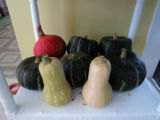Squash are technically fruit, but cooked as vegetables, and come in many different varieties, usually grouped into “summer squash” and “winter squash.” Zucchinis are summer squash.
Squash in this comparison refers to all types of squash in general, including average nutritional values.
Comparison chart
Is Zucchini a Squash?
Types of Squash
Species of squash include hubbard squash, buttercup squash, butternut squash, pumpkins, acorn squash, summer squash and zucchini. Summer squash, like zucchinis, are harvested while they are still soft and small, while winter squashes are harvested when they are fully grown, at the end of summer, and cured to harden the skin.
Types of Zucchini
Some varieties of zucchini include the golden zucchni, which has a milder taste, and the globe or round zucchini, which is 3 inches in diameter and designed for stuffing.
Nutrition
100g of the average raw summer squash includes 16 calories, 3.4g of carbohydrates, 1.1g of fiber, 0.2g of fat, 1.2g of protein, 2.2g of sugars,, and 95g of water. It has 12% of the daily recommended value of Riboflavin, 17% of Vitamin B6 and 20% of Vitamin C.
Zucchini also has 16 calories, 3.4g of carbohydrates, 1.2g of protein, and 1.1g of fiber, but it has only 1.7g of sugar and 0g of fat. It also has 28% of the recommended daily intake of vitamin C, 11% of Vitamin B6, and 8% of Riboflavin.
Health Benefits
Squash contains 10% of the recommended daily amount of dietary fiber, which can lower cholesterol, aid digestion, maintain low blood pressure and help prevent colon cancer. Winter squashes, such as pumpkins, contain high levels of vitamin A which can help improve lung health. The folate in winter squash also helps to protect against birth defects, while summer squash, like zucchini, promote cardiovascular health.
Zucchini in particular has a lot of vitamin C, which is a powerful antioxidant and an anti-inflammatory agent. The potassium in zucchini also helps to lower blood pressure, and its manganese helps the body produce collagen, which allows for healthy skin.
Culinary Uses
Although often cooked as a vegetable, squash are technically fruits. They can be served fresh, such as in salads, or stuffed and cooked. Uses vary wildly depending on the type of squash, from savory bakes to pies.
Zucchinis are usually served cooked, and can be steamed, boiled, grilled, baked, barbequed or fried. They can be used to bake bread, and zucchini flowers are a deep fried delicacy.





 Sweet Potato
Sweet Potato  Shallots
Shallots  Rutabaga
Rutabaga  Cilantro
Cilantro  Lemon
Lemon  Blackberries
Blackberries
Comments: Squash vs Zucchini